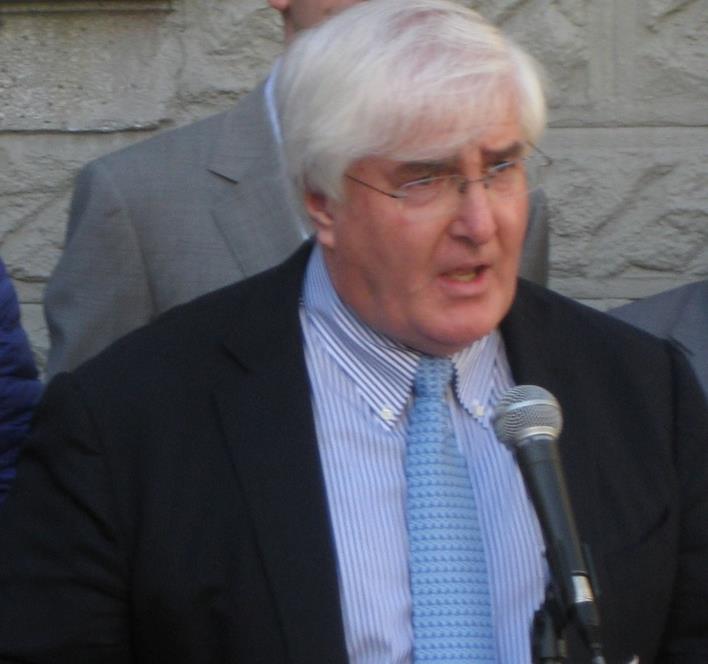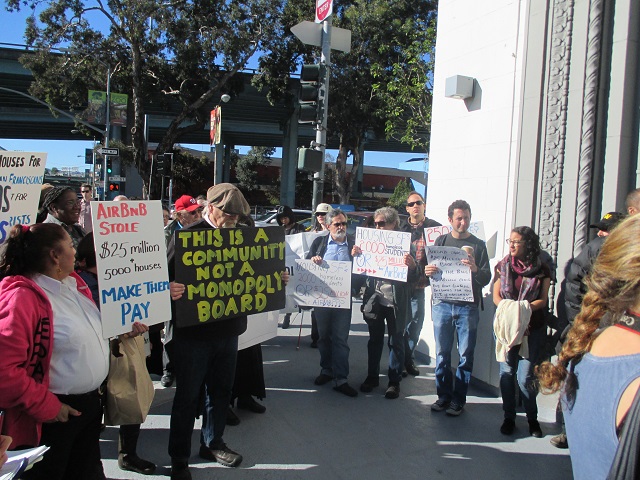The tide of tech and real-estate money flowing into the June 7th San Francisco election is now at more than $1 million, a stunning sum that’s paying in part for an all-out effort to keep the supporters of Airbnb and the developers in control of the city.
This is more than a record; it’s an ocean of big money the likes of which I have never seen in this kind of election.

Records on file with the Ethics Commission show it’s mostly coming from a few sources: Airbnb, Google, Facebook, Ron Conway, PG&E, the Association of Realtors, the Building Owners and Managers Association, the founder of Medium, the developer of the Monster on Mission, and a few other tech and real-estate interests.
Much of the money has gone to support the candidates in the real-estate slate for DCCC, although Airbnb has also given money to initiatives sponsored by the mayor, Supervisor (and DCCC candidate) Mark Farrell, and Sup. (and DCCC candidate) Malia Cohen.
A group funded mostly by progressive labor unions has raised $70,000 – a tiny fraction of what the tech and real-estate industry is spending.
And most of these right-wing groups still have cash in the bank, so in the next two weeks they will be able to fund a barrage of phone banking, mailers, and get-out-the-vote efforts.
They operate, of course, under misleading names like the Committee to Expand the Middle Class (funded to the tune of $450,000 by Airbnb) Progress San Francisco (funded by Conway, Google, and Facebook) and San Francisco Democrats United for Progress (funded by BOMA and the Realtors).
And if you ever wondered whether all that money makes a difference in how the body politic behaves, just take a look at the vote Wednesday night at the Democratic County Central Committee on a measure that would force Airbnb to be accountable for listing units that are clearly illegal.
As my friend at the Examiner, Joe Fitzgerald Rodriguez, notes in a brilliant analysis of the events:
Deep in the California State Building on Wednesday, the Democrats instead approved a strange, alternate-universe measure that weakened that support.
For funsies, I’ve dubbed this political maneuver the “Tom Hsieh Sway,” in honor of the democratic board member who deftly delivered Airbnb a win.
Snap your fingers. The first step in the Tom Hsieh Sway was to secure votes beforehand. Airbnb’s money conquers all.
The tech-hotel giant contributed $20,000 to a political committee to support Hsieh and his political allies on what they call the “Progress Slate” candidates running for DCCC this June. Airbnb contributed $2,500 to each of Hsieh’s allies on the committee: Zoe Dunning, Mary Jung, Rebecca Prozan, Alix Rosenthal and Leah Pimentel.
Gee-whiz, such a coinkydink the people taking money from Airbnb voted against a measure to call for its regulation.
Hsieh engineered what has become common at the not-so-D triple C: Instead of just voting against a measure that would harm his benefactors, he amended it to death, turned it into something no progressive could support, and then won its passage.
The original measure was introduced more than a week ago, was circulated, on the agenda … no secret. The Hsieh amendments came up only on the floor, were never circulated in advance – but somehow, many of his allies on the panel knew all about them in advance.
“What has been unique, and not in a good way, is the practice of gutting the resolutions that come before this body with ‘friendly’ motions to amend,” said DCCC Member Megan Levitan. “If you agree with it, support it, if you don’t, don’t.”
Oh, but Hsieh and his allies will never do that: In fact, in one of the most blatant examples of this technique, Josh Arce managed to gut a police-accountability measure – without ever going on record voting against police accountability.
As we noted at the time:
This seems to be the new strategy the conservatives are employing at the DCCC – let someone work for weeks or months on a carefully worded resolution, then substitute another one that undermines it at the last minute.
It allows the members to say they voted on, say, police reform – without doing anything of the sort. And it allows them to avoid taking a stand.
It’s yet another sign of the takeover of the local Democratic Party not only by allies of developers and the real-estate industry but by people who are unwilling to show any backbone at all on anything at all.
In this case, all of the people who got money from Airbnb voted to gut a resolution asking the supervisors to support reasonable regulations on Airbnb. All of the people who are independent of the tech-and-real-estate money voted the other way.
It was, in essence, a party-line vote – and since the real-estate-and-tech-company interests currently control the DCCC, they won.
That’s the way they want it to continue.
Let’s look at who’s paying to try to buy your vote June 7.
The Airbnb Committee, known as the group that wants to save the middle class (by driving renters out of the city) got $450K from that company, and $50,000 each from Paul Graham, CEO of Y combinator, Jessica Livingston, an investor in Y Combinator, and Sam Altman, president of Y combinator.
None of those people live in San Francisco; they’re all in Palo Alto.
Some of that money went to Props. A, B, and D. The rest has gone to elect the real-estate slate.
Then there’s the Progress SF slate, which has raised $292,000, with $25K coming from Ron Conway and $21K from Robert Rosania, developer of the Monster in the Mission.
Conway lives in Belvedere. Rosania lives in New York.
There there’s $50K each from Google and Facebook (which apparently suddenly care a lot about the workings of the SF Democratic Party – or maybe just got a call from Ron), $50K from Evan Williams, the founder of Medium, and $30K from Kevin Systrom, founder of Instagram.
Why did Google and Facebook suddenly get interested in who runs the SF Democratic Party? Why do Evan Williams or Kevin Systrom care? I don’t know. Is it possible that Conway called them up and said: We need to control the DCCC so we can get our people elected to the Board of Supervisors and keep the city friendly to tax breaks and loose regulations for Big Tech? That is, of course, how the system typically works.
Remember, the DCCC is not just a low-profile group that runs the local party. It has the ability to endorse candidates for local office — and in November, when thousands of voters who don’t pay that much attention to local politics but want to defeat Trump, go to the polls, that endorsement will be a major factor.
That’s why the big money is really here: These moguls want to control the city government, now and in the future.
Now let’s go to San Francisco Democrats United for Progress – which has as its treasurer Tom Hsieh Jr, the same person who gutted the Airbnb resolution. (Oh, and Ethics Commission records show he also plays a big role in the Progress SF group, and he is, of course, running for his own re-election, and he is also a campaign consultant getting paid to work on various campaigns.)
That committee raised a total of $125,000, with $25K coming from BOMA, $21K coming from Russ Flynn, one of the city’s biggest residential landlords, and $30K from the Association of Realtors.
The committee also got $40K from the Alliance for Jobs and Sustainable Growth PAC, which is funded in part ($5K) by Thomas Coates, one of the most notorious landlords in California and a man who has spent much of the past few years trying to repeal rent control statewide.
Follow the money: The Alliance also got $70K from the Committee on Jobs Government Reform Fund, which received $50K from Pacific Gas and Electric Co. and $25K from the family of the late Republican GAP mogul Don Fisher.
So PG&E, the Fisher family, and an anti-rent-control property owner are sliding money into the “Democrats United for Progress.”
That gives you a sense of who wants the real-estate slate to stay in power. And this is the Democratic Party in one of the most progressive cities in the nation?






